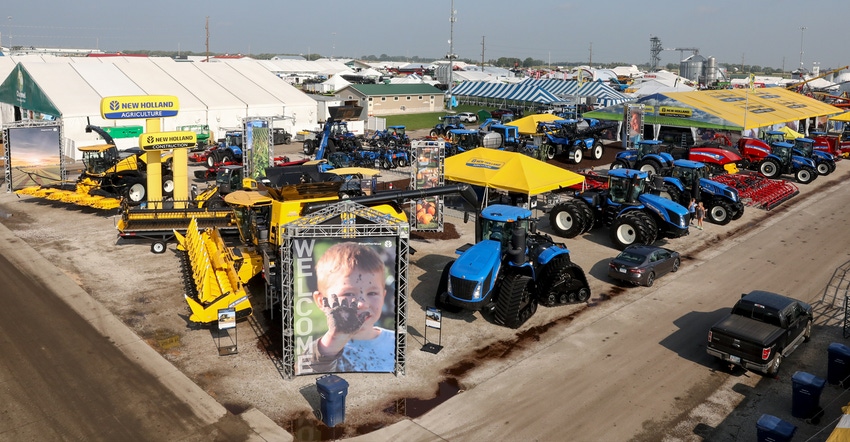
Segmentation in the ag equipment sector will continue to grow, according to Bret Lieberman, vice president of New Holland North America.
And with that comes many new opportunities.
"We are leveraging global platforms and global strength to be able to provide a product offering on a global scale, which is a full-line ag manufacturer," says Lieberman, who provided a glimpse into the company’s future at this year’s Farm Progress Show in Boone, Iowa.
New Holland Agriculture, part of CNH Industrial, has deep roots in the Northeast. It was founded in 1895 in New Holland, Pa., by Abe Zimmerman, who built machinery and engines for local farmers.
The brand has come a long way since then, coming out with the first automatic self-tie baler in 1937, the first twin-rotor combine in 1975 and a brand new autonomous tractor unveiled at the 2016 Farm Progress Show.
Farmers have many brands to choose from when it comes to purchasing a new combine or tractor, but Lieberman says the company is focused on catering to many different segments, whether that be specialty tractors on the West Coast, grape harvesters or self-propelled forage harvesters.
"Those segments we see as real opportunities for us," he says. "At the same time when we look at what we have in the cash crop stuff and the combine, we will always be proud of our combine and what it can do in the field."
Ag equipment sales in North America were up 21% in the second quarter of this year — April through June — over 2017, according to the company’s second quarter earnings report. Sales of large tractors rose 9% while sales of combines rose 26%. Small tractor sales, under 140 horsepower, rose 9%.
Still, the company has had some dark clouds to plow through, including the effects of the struggling dairy market on the industry.
 NORTH AMERICAN LEADER: Bret Lieberman is vice president of New Holland North America. He says that customer segmentation will increase in the ag equipment marketplace.
NORTH AMERICAN LEADER: Bret Lieberman is vice president of New Holland North America. He says that customer segmentation will increase in the ag equipment marketplace.

"These last couple of years for our dairy producers, it’s been tough. We have adjusted in line with the industries," he says. "We have to deal with that and it's what we’ve done with adjusting our production schedules, helping our dealers to be able to move some units that they might have wherever they are a little bit overstocked. We've done a good bit of that last year and had to do a little more of it this year, but we're adjusting for the cycles."
Trade has become a major issue for the company.
"On trade and tariffs, our position as an organization is the fewer trade barriers the better. If we have trade barriers that don't allow us to access those markets, it impacts then what we can do for the North American market just on economies of scale," he says.
"Everybody understands we're over-producers and we need access to global markets. Anything that limits us to get into these markets is going to put pricing pressures on the commodities," he says.
The company has 11 manufacturing plants throughout North America. Lieberman says improvements at the plants have enabled the company to venture into other nontraditional segments of ag equipment.
"With a product line like this that is so diverse you can’t afford to use some old technologies," he says. "You need the flexibility of laser cutting on sheet steel, plasma on plate. There’s less and less hard tooling that happens in the manufacturing space and it’s all about the flexibility to be able to provide the product offering that the customer is looking for.
"We're optimistic. We believe our competitive advantage is going to be our product and our people. We're really happy with what we are able to bring forward to the marketplace."
About the Author(s)
You May Also Like






